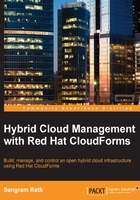
System requirements
Installing the Red Hat CloudForms Management Engine Appliance requires an existing virtual or cloud infrastructure. The following are the latest supported platforms:
- OpenStack
- Red Hat Enterprise Virtualization
- VMware vSphere
The system requirements for installing CloudForms are different for different platforms. Since this book talks about installing it on OpenStack, we will see the system requirements for OpenStack.
You need a minimum of:
- Four VCPUs
- 6 GB RAM
- 45 GB disk space
The flavor we select to launch the CloudForms instance must meet or exceed the preceding requirements.
Note
For a list of system requirements for other platforms, refer to the following links:
System requirements for Red Hat Enterprise Virtualization: https://access.redhat.com/documentation/en-US/Red_Hat_CloudForms/3.1/html/Installing_CloudForms_on_Red_Hat_Enterprise_Virtualization/index.html
System requirements for installing CloudForms on VMware vSphere: https://access.redhat.com/documentation/en-US/Red_Hat_CloudForms/3.1/html/Installing_CloudForms_on_VMware_vSphere/index.html
Additional OpenStack requirements
Before we can launch a CloudForms instance, we need to ensure that some additional requirements are met:
- Security group: Ensure that a rule is created to allow traffic on port
443in the security group that will be used to launch the appliance. - Flavor: Based on the system requirements for running the CloudForms appliance, we can either use an existing flavor, such as
m1.large, or create a new flavor for the CloudForms Management Engine Appliance. To create a new flavor, click on the Create Flavor button under the Flavor option in Admin and fill in the required parameters, especially these three:- At least four VCPUs
- At least 6144 MB of RAM
- At least 45 GB of disk space
- Key pair: Although, at the VNC console, you can just use the default username and password to log in to the appliance, it is good to have access to a key pair as well, if required, for remote SSH.